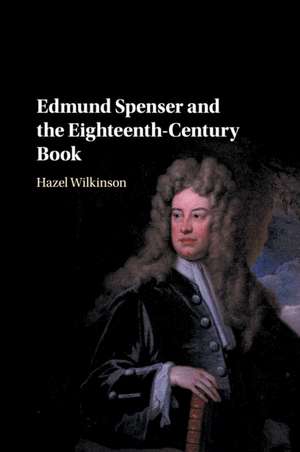Edmund Spenser and the Eighteenth-Century Book
Autor Hazel Wilkinsonen Limba Engleză Paperback – 10 iul 2019
Preț: 284.56 lei
Nou
Puncte Express: 427
Preț estimativ în valută:
54.47€ • 59.18$ • 45.78£
54.47€ • 59.18$ • 45.78£
Carte tipărită la comandă
Livrare economică 22 aprilie-06 mai
Preluare comenzi: 021 569.72.76
Specificații
ISBN-13: 9781316648919
ISBN-10: 1316648915
Pagini: 277
Ilustrații: 31 b/w illus. 2 tables
Dimensiuni: 153 x 230 x 15 mm
Greutate: 0.38 kg
Editura: Cambridge University Press
Colecția Cambridge University Press
Locul publicării:Cambridge, United Kingdom
ISBN-10: 1316648915
Pagini: 277
Ilustrații: 31 b/w illus. 2 tables
Dimensiuni: 153 x 230 x 15 mm
Greutate: 0.38 kg
Editura: Cambridge University Press
Colecția Cambridge University Press
Locul publicării:Cambridge, United Kingdom
Cuprins
List of abbreviations; List of illustrations; Acknowledgments; Introduction. 'The Wits have sent for the Book': (non-)reading, and Spenserian books before 1700; 1. Spenser the Whig: John Hughes's Clubbable Edition, 1715; 2. Miscellaneous Spenser: verse miscellanies and miscellaneous culture, 1716–50; 3. Spenser illustrated: Thomas Birch's 1751 Edition; 4. Spenser annotated: two scholarly editions, 1758–9; 5. Spenser and the public domain: the Scottish Publishers' series, 1778–95; Appendix A: checklist of the eighteenth-century editions of Edmund Spenser; List of works cited; Index.
Recenzii
'A crucial reminder that literary critics and historians alike have much to learn from the study of bibliography and the history of the book when done, as it is here, with evident care, admirable precision, and infectious enthusiasm for its subject.' N. K. Sugimura, The Library
'… a distinguished and learned book … Wilkinson deploys a formidable range of book historian's skills, allied to a sophisticated awareness of eighteenth-century culture … a serious piece of scholarship … that has been skilfully fashioned into a good story.' The Times Literary Supplement
'… a tour de force in bibliographical analysis … The discoveries made are too numerous to count … they add considerably to the depth and breadth of our knowledge of Spenser's reception in the eighteenth century.' David Hill Racliffe, The Spenser (www.english.cam.ac.uk/spenseronline)
'Wilkinson's book … should inspire more scholars to bridge the gap between cultural history and bibliography … it will be exciting to see how much more we learn about eighteenth-century reprints of poetry because of the new ground broken in Wilkinson's book.' J. P. Ascher, Script & Print
'Hazel Wilkinson argues that The Faerie Queene was the original unread classic: the emblematic textual commodity of an age in which book ownership expanded from the domain of aristocrats and scholars to become a bourgeois expression of taste … Wilkinson's project traces that Spenserian affect-at once stately and fanciful, imperially grand and appealingly gothic-across the whole of eighteenth-century English culture, from poetry and fiction to architecture, theater, political propaganda, sculpture, painting, and landscape gardening.' Catherine Nicholson, New York Review of Books
'… a distinguished and learned book … Wilkinson deploys a formidable range of book historian's skills, allied to a sophisticated awareness of eighteenth-century culture … a serious piece of scholarship … that has been skilfully fashioned into a good story.' The Times Literary Supplement
'… a tour de force in bibliographical analysis … The discoveries made are too numerous to count … they add considerably to the depth and breadth of our knowledge of Spenser's reception in the eighteenth century.' David Hill Racliffe, The Spenser (www.english.cam.ac.uk/spenseronline)
'Wilkinson's book … should inspire more scholars to bridge the gap between cultural history and bibliography … it will be exciting to see how much more we learn about eighteenth-century reprints of poetry because of the new ground broken in Wilkinson's book.' J. P. Ascher, Script & Print
'Hazel Wilkinson argues that The Faerie Queene was the original unread classic: the emblematic textual commodity of an age in which book ownership expanded from the domain of aristocrats and scholars to become a bourgeois expression of taste … Wilkinson's project traces that Spenserian affect-at once stately and fanciful, imperially grand and appealingly gothic-across the whole of eighteenth-century English culture, from poetry and fiction to architecture, theater, political propaganda, sculpture, painting, and landscape gardening.' Catherine Nicholson, New York Review of Books
Notă biografică
Descriere
The first comprehensive study of the eighteenth-century response to the Elizabethan poet Edmund Spenser, from editions to influence.
